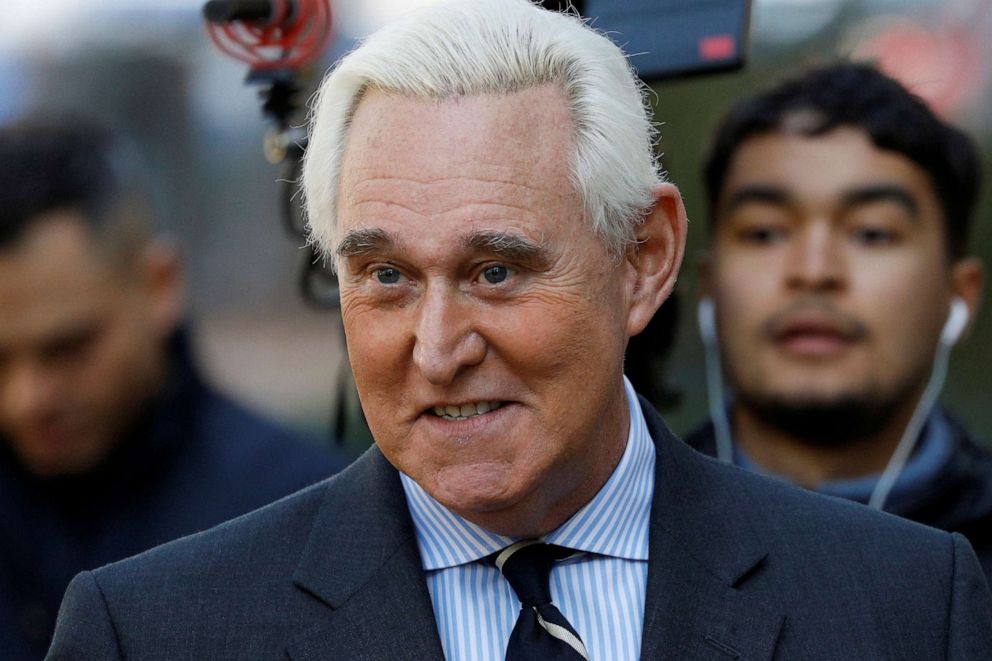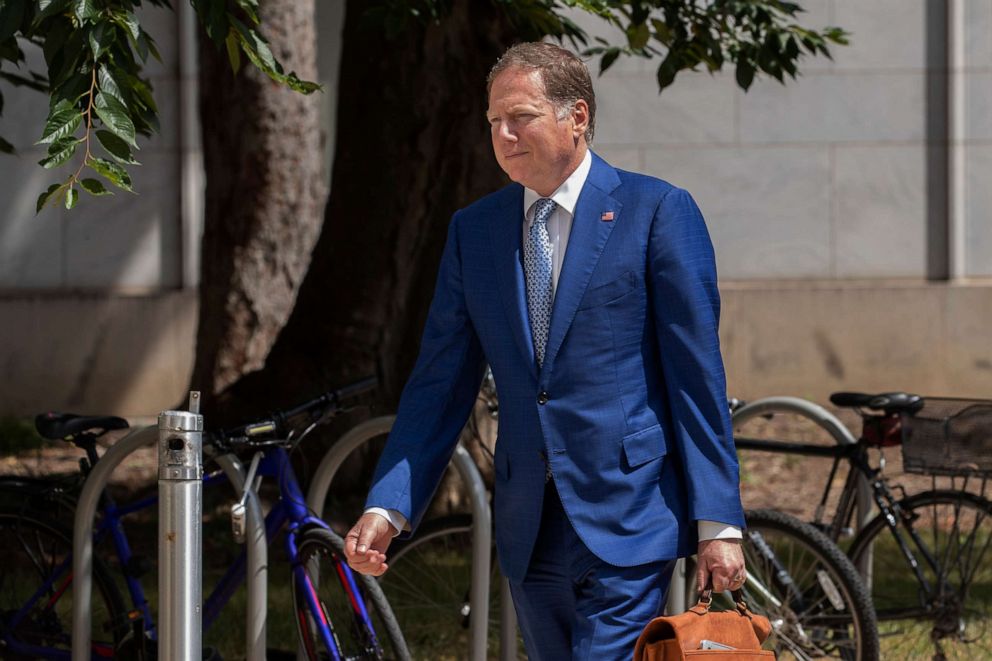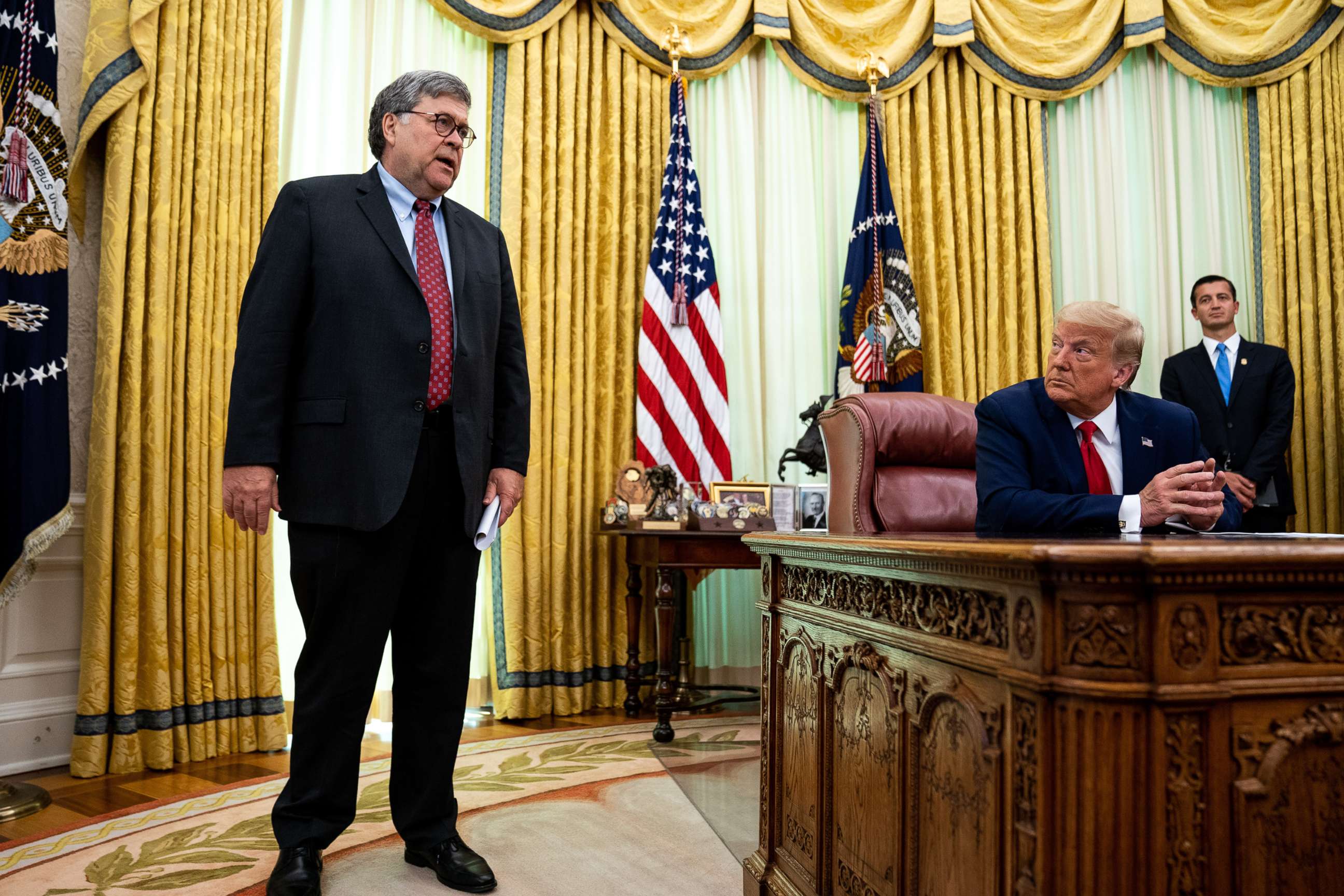Democrats to grill AG Barr over interventions in matters of interest to Trump
Barr hasn't testified before Congress in more than 450 days.
Attorney General William Barr is set to testify before the House Judiciary Committee Tuesday for the first time in his year-and-a-half long tenure as the nation's top law enforcement official.
Democrats hope to grill him over a long list of controversies and his repeated interventions in matters of interest to President Donald Trump.
Barr's appearance follows more than a year of stand-offs and delays -- he hasn't appeared before any congressional committee since May 2019 when he testified to a Senate panel on his handling of former special counsel Robert Mueller's report on Russia's interference in the 2016 election -- later declining to appear before the House.
Since then, outrage among Democrats on the committee has only grown over Barr's refusals to hand over documents or responses to their inquiries into episodes that they argue show clear politicization of the Justice Department under Barr's watch.
Democratic committee sources told ABC News the members plan to highlight how they believe Barr's actions have benefitted Trump and his reelection campaign over the national interest, on everything from policing and the role of federal law enforcement in national protests, to the commutation of longtime Trump ally Roger Stone's sentence and handling of former national security adviser Michael Flynn's case. In recent days the panel held a prep session for members to prepare for Barr's first appearance before the committee.
According to an opening statement released by the Justice Department Monday evening, Barr appeared ready to strike a tone of defiance amid Democrats' attacks.
"Ever since I made it clear that I was going to do everything I could to get to the bottom of the grave abuses involved in the bogus "Russiagate" scandal, many of the Democrats on this Committee have attempted to discredit me by conjuring up a narrative that I am simply the President's factotum who disposes of criminal cases according to his instructions," Barr is expected to say. "Judging from the letter inviting me to this hearing, that appears to be your agenda today."

Late last month, two current officials in the department appeared before the committee to outline allegations of political interference in the DOJ's antitrust division, as well as Barr's move to overrule career prosecutors' sentencing recommendation for Stone.
The Justice Department disputed the accounts of both whistleblowers, John Elias and Aaron Zelinsky, as "hearsay" and Barr has insisted his decision to recommend a lighter sentence for Stone was in no way tied to the president -- despite Trump's tweet congratulating Barr just hours after the prosecutors on the case resigned over his intervention. Trump later commuted the entirety of Stone's sentence.
Barr will also likely face questions over his handling of the firing of former U.S. Attorney for the Southern District of New York Geoffrey Berman in June.
Earlier in the month Berman testified behind closed doors to the committee in detail about his ouster, raising issue -- in particular -- with how Barr sought to offer him alternative positions in the administration as a means of securing his resignation, while handing over temporary control of the office to an ally, the U.S. attorney in New Jersey Craig Carpenito as the president's permanent nominee Jay Clayton awaited confirmation before the Senate. After a dramatic weekend showdown, Berman agreed to leave the office after he said Barr had decided to "respect the normal operation of law" and hand over control of the office to Berman's deputy Audrey Strauss.

House Judiciary Chairman Jerry Nadler argued Barr's efforts to "entice" Berman to step down seemed like a "kind of quid pro quo" that "is awfully close to bribery." Nadler and other Democrats on the committee have suggested that impeachment of Barr remains on the table, despite the fact it would almost certainly face a similar end as Trump's acquittal following his impeachment earlier this year.
Nadler's committee already voted to hold Barr in contempt last year for defying congressional subpoenas over the failed effort to add a citizenship question to the 2020 census.
Republicans on the committee have sought to defend Barr from what they have described as a fishing expedition by Democrats who are frustrated with Barr's criticism of the FBI and its investigation into Trump's 2016 campaign. Barr has questioned the basis for the Russia investigation and last year tasked U.S. Attorney John Durham with probing any potential criminal wrongdoing by law enforcement officials involved in its early stages.
In May, Barr ordered the criminal case against Trump's former national security adviser to be dismissed after Barr said a separate review uncovered evidence undercutting the legitimacy of the FBI's investigation. But the district judge overseeing Flynn's case, Emmet Sullivan, did not immediately accept the DOJ's motion, and Sullivan is currently appealing an order from a panel on the higher D.C. Circuit Court that recently demanded he agree to throw out the case.
A source familiar with Republicans' strategy leading up to the hearing said their members, by contrast, will likely look to focus attention on policing and the response to unrest that has in some cases sparked violence in cities across the country.

In recent weeks, Trump and Barr have dispatched a surge of federal officers to cities around the country seeing spikes in violent crime, in addition to dozens of federal agents sent to Portland, Oregon, and Seattle, whom Barr said would be tasked with protecting federal property amid protests. The deployments have drawn scrutiny from Democrats and local officials in the cities, who have questioned both the the administration's legal authorities and the tactics employed by officers on the ground.
A Democratic committee counsel said the majority would press Barr on the deployments "designed to give the president the graphics he wants with his campaign," along with his recent comments about expanded mail-in ballots leading to widespread fraud, which were criticized by election security experts.
Last week, the DOJ's inspector general Michael Horowitz announced he had opened an investigation into conduct by agents in Portland, as well as the department's controversial response to unrest in Washington, D.C., and the push against mostly peaceful protesters on June 1 that made way for Trump's photo-op in front of a church next to Lafayette Square.
Nadler and other Democratic lawmakers sent a letter to Barr soon after the incident demanding answers about his role in ordering the protest's dispersal. Barr has denied that the order to move back the protest was connected to Trump's photo-op.
Separately on Tuesday morning, the House Natural Resources Committee will hold a hearing titled, "Unanswered Questions About the US Park Police's June 1 Attack on Peaceful Protesters at Lafayette Square." Acting Chief of the U.S. Park Police Gregory Monahan and District of Columbia National Guard Maj. Adam DeMarco are slated to testify.




